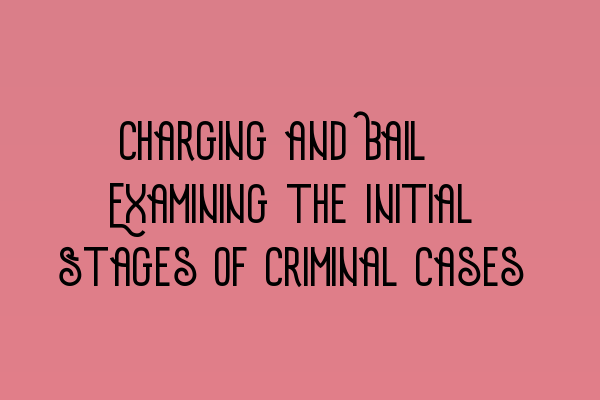Charging and Bail: Examining the Initial Stages of Criminal Cases
At SQE Criminal Law & Practice Law UK, we understand the importance of the initial stages of criminal cases in the legal process. Charging and bail are essential aspects that shape the trajectory of a case and impact the defendant’s rights. In this comprehensive blog post, we will delve into the intricacies of charging and bail, providing valuable insights into how they function.
Understanding Charging
In criminal law, charging refers to the formal accusation of an individual for committing a crime. This stage occurs after thorough investigation and gathering of evidence by law enforcement agencies, which include the police and other investigative bodies. Our SQE 1 Practice Exam Questions article can help you prepare for the multiple-choice questions related to charging.
Once the investigation is complete, the prosecution evaluates the evidence to determine if there are reasonable grounds to charge the suspect. If the prosecutor believes there is sufficient evidence, a charging decision is made, and the defendant is formally charged with the specified offense.
It is crucial for the defendant to understand the charges brought against them. Our SQE 2 Preparation Courses provide comprehensive knowledge and guidance on the legal procedures involved in charging.
Examining Bail
Bail is the temporary release of a defendant from custody before their trial. It serves the purpose of ensuring that the defendant attends court proceedings without posing a flight risk or endangering the community. Our SQE 1 Practice Mocks FLK1 FLK2 article offers valuable insights into the practical scenarios related to bail.
When deciding whether to grant bail, the court assesses various factors, including the seriousness of the offense, the defendant’s criminal record, ties to the community, and the likelihood of the defendant interfering with witnesses or evidence. These considerations aim to strike a balance between the defendant’s rights and maintaining public safety.
Understanding the conditions of bail is vital for the defendant. Our SQE 1 Preparation Courses provide in-depth knowledge on the factors considered and how bail applications can be made.
SRA SQE Exam Dates
If you are currently preparing for the SQE exams, be sure to check out the SRA SQE Exam Dates to stay informed about the upcoming examination periods. Planning your study schedule around these dates will help you stay on track and ensure you have adequate time for preparation.
At SQE Criminal Law & Practice Law UK, we are committed to providing the necessary resources and courses to aid your success in the SQE exams. Our team of experienced professionals is dedicated to equipping you with the knowledge and skills required to excel in criminal law and practice.
Stay tuned to our blog for more informative articles and updates on the SQE exams. If you have any questions or need further assistance, please do not hesitate to reach out to us. We are here to support you on your journey to becoming a qualified solicitor.
